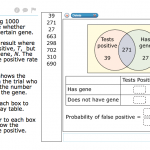Florida Schools Chief Picks AIR For Next Statewide Test

Screen capture
Florida schools chief Pam Stewart is recommending the American Institutes for Research to produce Florida's next statewide test.
Education Commissioner Pam Stewart has recommended the American Institutes for Research produce Florida’s next statewide exam.
The new, as-yet-unnamed test is required because Florida is finishing the switch to new math, language arts and literacy standards largely based on the Common Core State Standards adopted by Florida and 44 other states. The current Florida Comprehensive Assessment Test was not designed for the new standards.
“The new assessment will include more than just multiple choice or simple fill-in-the-blank questions,” Stewart wrote in a letter to parents. “Students will be asked to create graphs, interact with test content and write and respond in different ways than on traditional tests.”
AIR will field test exam questions in Utah this year and the test will include the more complicated questions known as performance tasks. Those are interactive, puzzle-like tasks students must do to answer the question.
Students will be able to take a version of the test online or with a pencil and paper next year. Gradually, the state will move towards all online exams.
The contract with AIR will be for $220 million over six years, according to documents the agency posted online. The suite of tests will cost $34.23 per student, per year. The FCAT currently costs $36.17 per student, per year.
AIR’s math and English language arts exams will cost $19.28. The balance of the cost is science and other end-of-course exams.
AIR was one of five firms competing for the exam. The D.C.-based non-profit beat out bids from ACT, CTB/McGraw-Hill, McCann Associates and Pearson. Pearson currently holds the FCAT contract.
Michael Brickman, national policy director for the Thomas B. Fordham Institute said the choice of AIR is something of a surprise because the ACT Aspire seemed the front-runner until very recently.
Florida was a leading member of the Partnership for Assessment of Readiness for College and Careers, or PARCC, one of two multi-state groups developing exams with a federal grant. Smarter Balanced is the other group.
PARCC has been publishing sample questions for months and appears to be a good test, Brickman said.
But the exams use of federal money worried conservative activists, and legislative leaders said PARCC would cost too much and require too much testing time.
“It remains to be seen what the other organizations end up providing,” Brickman said, noting AIR’s research has a “solid reputation.”
“We’ll have to wait and see what their finished product looks like,” he said.
Brickman said it will be interesting to see if other states follow Florida’s lead and choose AIR exams.
Another big question is whether Florida will be able to use the AIR exam results to compare student performance with other states — one of the selling points of Common Core. Stewart said comparing results with other states would be a “bonus,” but choosing a test which measured Florida’s standards was the first priority.
New American foundation policy analyst Anne Hyslop said comparing state results will still be possible with the National Assessment of Educational Progress.
But Florida educators will need to make sure they carefully vet any sample items for the new test, Hyslop said. While cost and testing time were important, politics were also a factor in the decision.
“They clearly want to make the case that AIR is an independent entity outside of PARCC and Smarter Balanced,” she said. Hyslop said that Florida teachers, students and parents had several years to prepare for PARCC. Now, they’ll have less than a year for AIR’s exam.
“It may make it more difficult for students and teachers to know what’s coming next year,” she said.


